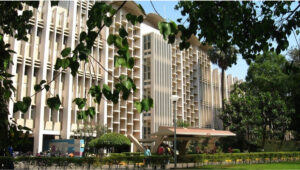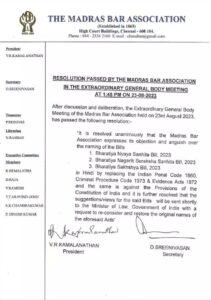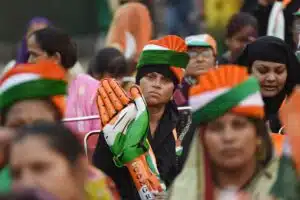Politics News
Terence Tao, often heralded as one of the most prodigious mathematicians of our time, boasts an intellect that has left many in awe. His…
A North Carolina resident has initiated a legal action against…
Canada has refused an Indian travel advisory and cautioned travellers…
In a first, IIT Bombay has received an anonymous donation of INR 160 crore, with…
The Madras Bar Association’s objection to the proposed renaming of crucial legal statutes marks a significant development in India’s ongoing debate over linguistic representation and adherence to constitutional principles. The association’s concerns primarily revolve around the proposed Hindi names for the Indian Penal Code (IPC), Code of Criminal Procedure (CrPC), and the Indian Evidence Act, which it believes could potentially violate the spirit of the Constitution.
The heart of the Association’s objection lies in the choice of names for these bills. The transition from English nomenclature to Hindi, while aimed at promoting linguistic harmony, has raised apprehensions about potential constitutional violations. The Association contends that renaming these laws in Hindi contradicts the Constitution’s provisions safeguarding linguistic diversity, cultural inclusivity, and equitable representation. This issue brings forth a larger concern about striking a balance between linguistic identity and constitutional values.
The Association strongly advocates for retaining the existing English names of these legal statutes. It argues that these names have become deeply rooted in the legal community and reflect India’s historical connection with English common law. This consistency in nomenclature supports effective communication within the legal ecosystem and maintains continuity in legal proceedings and scholarly discussions.
The timing of the bills’ introduction by Union Home Minister Amit Shah during the Monsoon Session of Parliament further adds to the complexity of the debate. These proposals are now in the hands of the Parliamentary Standing Committee, which will evaluate their alignment with constitutional principles. The fate of these proposed name changes hangs on the Committee’s recommendations.
This debate underscores the challenge India faces in reconciling linguistic diversity with constitutional values. While promoting Hindi as a unifying language is commendable, it must be done in a way that respects the nation’s rich linguistic tapestry. The Madras Bar Association’s objection highlights the significance of interpreting linguistic changes within the broader context of constitutional norms.
From a law student’s perspective, this situation offers a firsthand look at how legal principles, including constitutional ideals, can evolve over time. It showcases the interplay between language, culture, and the legal framework. Aspiring legal professionals can gain insights into how linguistic shifts impact legal practice and the justice system as a whole.
At the core of this controversy lies the Indian Constitution, serving as a guiding force that shapes the nation’s ethos. The Madras Bar Association’s objection emphasizes the Constitution’s role in safeguarding linguistic and cultural rights. This situation serves as a reminder that any legal transformation must be carried out while upholding the Constitution’s spirit.
In conclusion, the Madras Bar Association’s stance against renaming key legal statutes in Hindi reflects a broader concern about striking a balance between linguistic representation and constitutional harmony. The association’s call to preserve established English names underscores the importance of maintaining legal continuity while embracing linguistic diversity. As the bills await evaluation by the Parliamentary Standing Committee, India watches closely to witness how the nation navigates the intricate intersection of language and law, guided by the principles enshrined in its Constitution.
Rahul Gandhi brought forth the dispute over the China border, stating that the administration has…
Date, Location, Case Details Kolkata, August- 24 The controversy surrounding the murder of a…
The Ministry of Education (MoE) has introduced a New Curriculum Framework (NCF) recently. The Union…
In an unfortunate convergence of man-made encroachments and the unrestrained force of nature, Punjab finds…
Web Stories
Latest Posts
Contact us:
online@asianatimes.com
Copyright © 2024 Asiana Times. All Rights Reserved






















